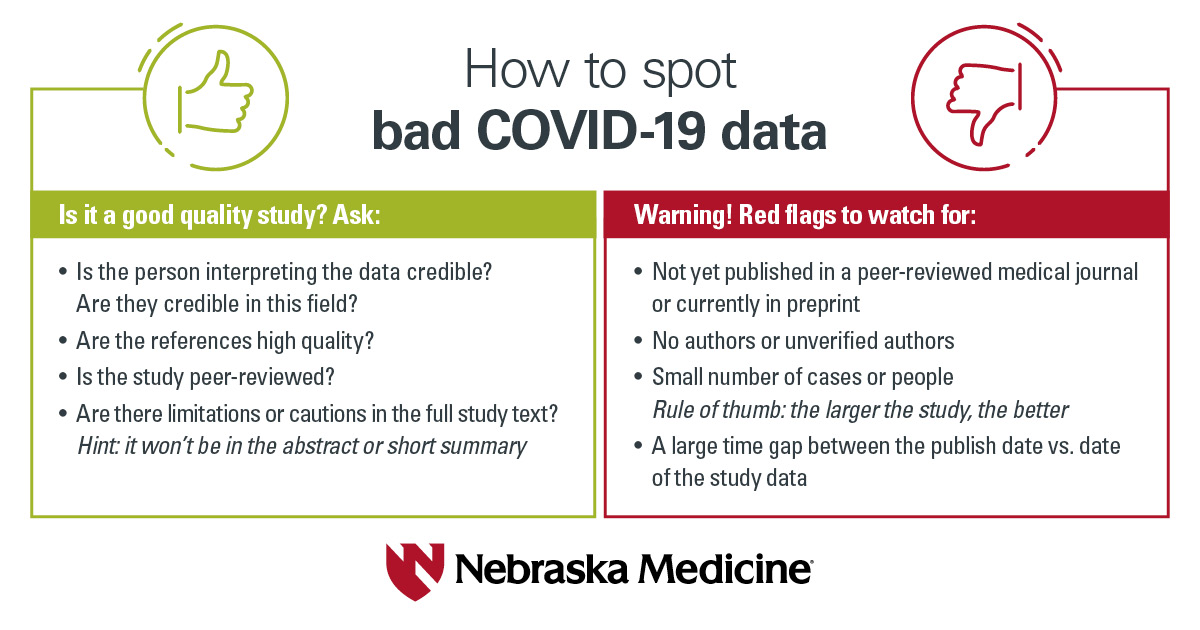Do mRNA COVID vaccines cause an 84% increase in death? Tips on how to spot bad COVID data

The medical community has worked hard to learn all it can about COVID-19 in the past few years. With so many changing variables and the challenge of new variants over time, the research continues.
As new variants arrive on the scene and vaccine recommendations are adjusted, it’s essential to look for accurate and reliable vaccine information. This includes knowing how to interpret fact from conjecture when reading the latest COVID-19 headlines.
What you should know about Florida’s press release (and the study it was based upon)
In October 2022, the Florida State Surgeon General issued a press release. Concerns have been raised about the statements made by Joseph Ladapo, MD, the validity of the study they were based upon, and the guidelines that were recommended as a result.
An analysis of the study’s data reported an 84% increase in the relative incidence of cardiac-related death among males 18 through 39 years old within 28 days following mRNA vaccination.
“Sweeping statements like this seem overly aggressive considering there are several factors that call into question the validity of this study,” says Kelly Cawcutt, MD, Nebraska Medicine infectious diseases specialist. “This is an unusual and unorthodox way to present scientific data. To our knowledge, the data has not gone through the normal rigors of a proper scientific study.”
What the press release failed to say
The analysis stated that the study had significant “limitations and should be interpreted with caution.”
Red flags include a lack of peer review, the small size, poor design and lack of author validity, to name a few. If you look at the study’s conclusions, it does not pass as what the scientific community would consider a high-quality study.
“When I look at the details, I see that they didn’t look at the medical records, only the death certificates,” says Dr. Cawcutt. “As a result, we don’t know why or if these people actually had a cardiac death or if there were other medical conditions that could have been contributing factors.”
The risk of COVID-19 infection complications far outweighs the risk of vaccine complications
“At the end of the day, the data has held firm in showing that the actual COVID-19 infection has had a higher complication rate than the vaccine has had by far,” adds Dr. Cawcutt. “And for those concerned about the mRNA COVID vaccines, we now have Novavax, which is a protein subunit vaccine. Talk to your doctor to discuss which vaccine is best for you.”
Learn more about the different types of COVID-19 vaccines and boosters available to date.
How to spot bad COVID data
Scientific literature is not easy to understand. It is difficult to tell good from bad data without consulting someone you can trust to help you correctly interpret the data and understand if it’s a high-quality study or not.
Not every published study is a good quality study
Ask yourself the following questions when looking at a research study or reading an article that cites a research study:
- Who is giving the data interpretation? Are they credible in this field?
- What is the quality of the reference?
- Has it been through a peer-reviewed process?
- Are there limitations or cautions in the study itself?
Warning signs that should give you pause:
- A research study that is only in preprint or not published in an actual peer-reviewed medical journal. This would suggest it did not meet the baseline criteria of scientific standards for publishing
- An article or study that has no authors or authors that cannot be verified. These raise questions about the data, where it came from and who is responsible for the data’s accuracy
- A study that finds associations based on small sample sizes (numbers of cases or people). In general, the smaller the number of patients and patient events, the less likely the data is accurate to the larger population. This also introduces bias related to who is engaged in the data and how it is reported. A good rule of thumb: The larger the study, the better to show accurate findings that can be generalized across a multitude of people
- Older dates of when the study data was pulled. The publish date may be quite different from the date the data was initially pulled, and much can change between the two timeframes
If you’re concerned about COVID-19 vaccinations or what vaccination plan is best for your situation, have a conversation with your doctor. Your benefits and risks may be different from the next person depending on your circumstances.
Learn more about recent COVID-19 variants, COVID-19 vaccine statistics and rare side effects.
Get more information about COVID-19 vaccine safety and the updated bivalent COVID-19 booster.






